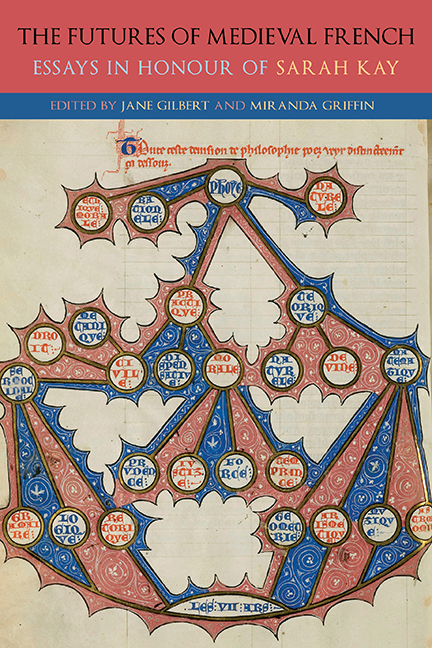Book contents
- Frontmatter
- Dedication
- Contents
- List of Illustrations
- List of Contributors
- List of Abbreviations
- Introduction
- Part I Subjectivity in Troubadour Poetry
- Part II The ‘Chansons de geste’ in the Age of Romance: Political Fictions
- Part III Courtly Contradictions: The Emergence of the Literary Object in the Twelfth Century
- Part IV The Place of Thought: The Complexity of One in French Didactic Literature
- Part V Parrots and Nightingales: Troubadour Quotations and the Development of European Poetry
- Part VI Animal Skins and the Reading Self in Medieval Latin and French Bestiaries
- Afterword
- General Bibliography
- List of Manuscripts
- Bibliography of Work by Sarah Kay
- Index
- Gallica
Afterword
Published online by Cambridge University Press: 27 May 2021
- Frontmatter
- Dedication
- Contents
- List of Illustrations
- List of Contributors
- List of Abbreviations
- Introduction
- Part I Subjectivity in Troubadour Poetry
- Part II The ‘Chansons de geste’ in the Age of Romance: Political Fictions
- Part III Courtly Contradictions: The Emergence of the Literary Object in the Twelfth Century
- Part IV The Place of Thought: The Complexity of One in French Didactic Literature
- Part V Parrots and Nightingales: Troubadour Quotations and the Development of European Poetry
- Part VI Animal Skins and the Reading Self in Medieval Latin and French Bestiaries
- Afterword
- General Bibliography
- List of Manuscripts
- Bibliography of Work by Sarah Kay
- Index
- Gallica
Summary
THE INTELLECTUAL TRAJECTORY traced by Sarah Kay's monographs, and by the studies inspired by them in this book, offers an eloquent route map of some of the major developments in medieval French studies since the 1980s. The engagement in her work with, for example, feminism, anthropology, psychoanalysis, contemporary and medieval philosophy, and animal studies underscores the vibrant interdisciplinarity of research on medieval French literature over the last thirty or so years. If Kay at the start of her career drew inspiration from theoretically informed French medievalists writing in the 1970s – scholars like Stephen G. Nichols, R. Howard Bloch, Peter Haidu, Eugene Vance, and particularly Paul Zumthor – her commitment to feminism and her turns to psychoanalysis and philosophy set her work apart from what went before. And if there were a number of fellow travellers in the move to bring modern theory to medieval French literature, Kay seems to have always had a knack for opening new questions and pointing towards new ways of structuring those questions. This forward-looking nature of Kay's work was one of the main reasons for calling this book The Futures of Medieval French.
It seems appropriate, therefore, to end this book with a brief reflection on how Kay's recent work may offer pointers to where the discipline is headed now. We see three main features of her recent work that are suggestive as to the directions the discipline may take over the next few decades: first, a return to philology (albeit a renewed version of it) and some core medievalist skills; second, a further expansion of theoretically informed interdisciplinary enquiry and dialogue; third, a whole-hearted and creative adoption of the potential of the digital age and methods to enhance our research. All three of these features are in evidence in the most recent of Kay's books to be discussed in this collection, Animal Skins and the Reading Self: her close scrutiny of the manuscript page as a signifying space is deeply philological as well as codicological (and, in this respect, entirely different from the text-focused criticism Kay practised at the beginning of her career) and theoretical; the engagement with animal studies and the post-human turn brings Animal Skins into dialogue with a range of disciplines with which Kay's work had not previously engaged systematically;
- Type
- Chapter
- Information
- The Futures of Medieval FrenchEssays in Honour of Sarah Kay, pp. 329 - 332Publisher: Boydell & BrewerPrint publication year: 2021



